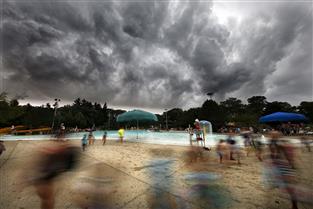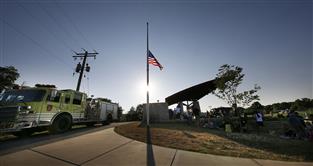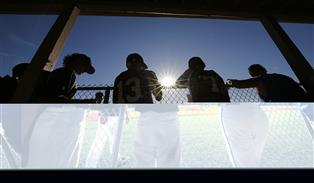The full weight of the city of Wauwatosa, the city of Milwaukee, Milwaukee County, Wisconsin Electric Power Co., neighborhood groups, a school, a church, Wisconsin Lutheran College, dozens of businesses and hundreds of residents wasn't enough to convince the Public Service Commission to bury any portion of a planned electric power line to serve the Milwaukee County Medical Center.
The commission "appropriately balanced economic, engineering, environmental and community concerns to get to a good result," Commissioner Eric Callisto said in a statement issued Friday.
But it's hard to find a Wauwatosan who thinks the decision is either balanced or a good result.
'A slap in the face'
Community leaders were struggling to wrap their minds around the selected route this week and its potential impact on neighborhoods, private properties, wetlands, development zones, and the landscape.
City Attorney Alan Kesner said the city spent close to $100,000 in attorney and consultant fees fighting exactly this outcome, and not all the bills have arrived yet.
"The PSC's decision is tragic," said city Development Developer Paulette Enders.
"It's nothing but a big slap in the face to residents of Milwaukee and Wauwatosa," said Wauwatosa Common Council President Dennis McBride.
The chosen western route connects to an existing line at Underwood Creek and 120th Street, cuts across the county Greenhouse Center and Sheriff's Department auto lot, and skirts Innovation Campus, following Highway 45 south to Watertown Plank Road, where it heads east to a new substation at the Wisconsin Electric power plant next to the campus.
Early reports had the line bisecting Innovation Campus, but the route was changed from plans as they were recently understood.
Money weighed heavily in the decision. The total cost for an all-above-ground power line was put at $11.6 million, including the western line through Wauwatosa and a north-south route through Milwaukee. The cost for burying all of it was in the range of $45 million to $61 million, the commission said.
Total project costs, including a new substation, transmission and certification costs are $34 million, the PSC said.
Underwood vs. Walnut
The decision to put the power line on Underwood Parkway is in direct contravention of the Common Council's formal preference for the line to follow Walnut Road, the only other option the city seriously considered.
"We are very satisfied, we are very pleased with that outcome," said Jenny Wisniewski, a Walnut Road resident who has been a leader in opposing the Walnut Road option. "But we also want the city to know that we are as dismayed as anybody else in the city with the fact that there will be overhead lines all the way to the substation, through real visible parts in the city."
Kit Hansen, who chairs the Preserve Our Parkway group that's made up of Underwood Parkway residents, called the decision to locate the line in front of their homes "concerning news." She said members of her group are "sort of in shell shock."
"So many people worked so hard" to prevent this outcome, Hansen said.
Beyond concerns about property value, she said, "it's not just about saving greenspace at this point, it's about what it's doing to the development of this area of Milwaukee."
Hansen viewed the PSC's comment - that "under 1 percent" of the 11,000 miles of transmission lines in the state are underground - as a poor defense of its decision.
"It seems to me projects should be considered in terms of their own individual uniqueness and needs. We are a very intensely urban area," she said.
She said her group would support any action the city might pursue in terms of an appeal.
What's at stake
The biggest tangible loss to the city of the chosen route may be the limiting of development options for the northwest quadrant of the County Grounds, where the Greenhouse and the Sheriff's auto center now reside.
Enders testified in the PSC hearings that attracting development would be slowed if power lines were directly overhead. And it may knock the site down from a possible Class A office space development to light industrial space, which would have much lower property values and thus pay lower property taxes.
The impact on the development of Innovation Campus, with power lines lining two sides, can also be viewed as a major concern -a discarded option would have buried the line as it went through the campus. However, nobody contacted was prepared to comment on the PSC's decision, in that regard.
For McBride, it's a pocketbook issue: "All those areas are going to be affected by overhead power lines and it's going to have a negative impact on our ability to create the kind of family-supporting jobs that everyone likes to talk about."
The city strategy
More than a year of anguished debate prompted the Common Council to adopt a strategy of endorsing an all-underground route that started on Walnut Road. As a second choice, the city offered a hybrid route, down Mayfair Road and underground along Watertown Plank, that was less expensive.
Wisniewski and others were critical of the city's strategy, saying acceptance of the city all-underground route was highly unlikely because it would have been a "precedent-setting decision" for the PSC. They thought a better strategy was to promote a lower-cost option, starting on Underground Parkway and going underground along Watertown Plank.
"Our opinion was quickly dismissed, the city continuing to chase the idea of a fully underground route," she said.
Kesner said he has no regrets about the strategy the city pursued. "I think we put the best case forward we could. It's a matter of whether the PSC is going to listen to it or not."
The PSC statement makes clear the commission's distaste for underground wiring. It chooses overhead lines except "in very limited situations, generally to address technical or engineering concerns" - not just because a community prefers not to see the wires.
What about the PSC?
Cheryl Nenn, of Milwaukee Riverkeeper, is one of many who has questions about the authority of the PSC.
"As someone who has worked with the PSC now on transmission line issues, water rate cases (Milwaukee and Waukesha), and Valley Power Plant issues, I'm increasingly concerned with the tremendous power and lack of accountability of the PSC," Nenn said in an email. "Given the tremendous impacts to Wauwatosa, Milwaukee County Parks, and Milwaukee, I'm hoping that the governments can work together to put some pressure to bear on this decision."
McBride has some of the same concerns.
"There is tremendous power and a lack of accountability," he said. "And the reason I say that … is there are some grounds that you can challenge the PSC on, but very few, and very narrow in scope."
The commission "has no judicial oversight, so the PSC is free to do whatever it darn well pleases, and there's no accountability to voters," McBride said.
Kesner said an appeal would be in the form of a court action, although it was way to early to say whether the city would consider such a move.
PSC commissioners are appointed by the governor and serve staggered, six-year terms. The current commissioners are Phil Montgomery, appointed in March 2011 by Gov. Scott Walker; Eric Callisto, appointed in May 2008 by Gov. Jim Doyle; and Ellen Nowak, appointed in July 2011 by Walker.
On the PSC website, those seeking comment are warned not to contact commissioners directly on contested cases. The PSC has not yet issued a formal "order" on the ATC power line application, though a spokeswoman said it was likely to differ little from the "preliminary decision" announced in the Friday press release.
More from News and Features
- Anodyne Coffee plans to open location in Wauwatosa Village
- Wauwatosa Meetings: Aug. 4
- Video: Wauwatosa girl's curbside ice cream stand raises money for the hungry
- Wauwatosa News and Notes: Hands-only CPR training offered; Firefly Art Fair is Aug. 6-7
- Wauwatosa Ask Now: Why are there barriers and fencing along the North Avenue bridges over the Menomonee River?
- Mystery Photo Contest: July 28
- Wauwatosa gears up for National Night Out event, this year at the zoo
- Election 2016: Wisconsin's 4th District candidates weigh in
- Wauwatosa's Luther Manor residents share smiles through flower delivery
- Wauwatosa Police Report: July 17-23














